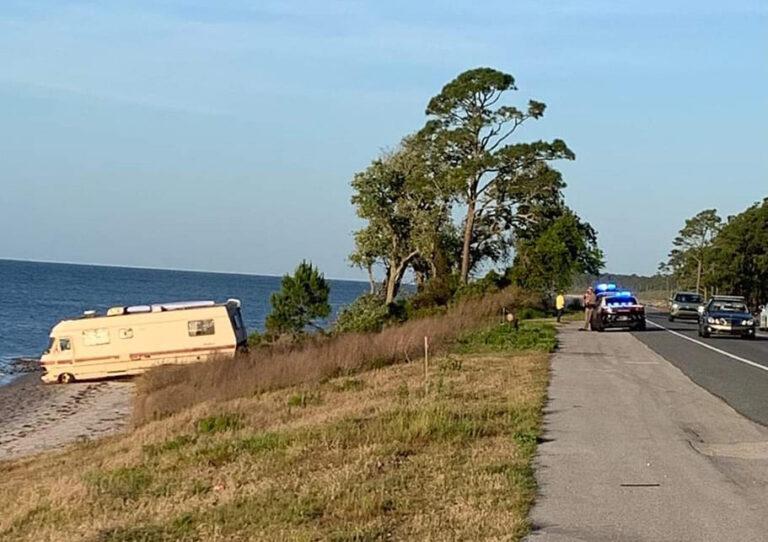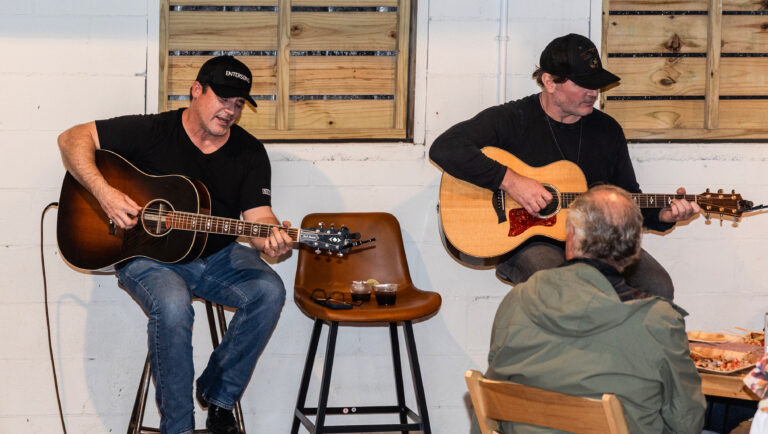Legacy Post Disclaimer
This is a #Legacy post imported from The Apalachicola Time’s previous platform. If you’re experiencing issues with this article, please email us at news@nevespublishing.com.
Alligator Point residents back restricting beach access
A county commission workshop last week on parking made one thing abundantly clear.
The people of Alligator Point are mad as heck and don’t want to take it anymore.
In an afternoon workshop before four of the five county commissioners, Noah Lockley was absent, a steady stream of Point residents rose to voice their thoughts. And even some drastic measures, such as completely shutting down public access to the beaches.
“These problems have been before you all for years,” said Dick Hosford. “They’re not going away; they’re going to get worse, way worse. This is a huge problem.”
One assertion, that County Attorney Michael Shuler refuted, is that areas marked on the original plat, worked out between private landowners and the circuit judge more than 50 years ago, were never intended as public beach access.
“It’s a big misconception, it needs to be looked into,” said John Berry, claiming that in the plat “it does not say general public. In Black’s Law (Dictionary), there’s a difference between ‘public’ and ‘general public.’ The residents of Alligator Point are the ones supposed to (benefit) from beach access.”
Shuler said he would look into the claim, but cast doubt on it, particularly since he litigated, and won, a similar case more than a decade ago regarding beach access points on St. George Island.
“I don’t think you can cut off public access to a public beach,” he said. “A public dedication is a public dedication. I’ll go back and look at it again but I’m not aware of facts that they’re not public beaches. Public access to a public beach includes everyone.”
Another resident, Charles Korst, advocated closure of these access points, all but forcing visitors to travel to Bald Point State Park for their beachgoing.
“These points may have been intended for local resident use only. They can no longer support current use,” he said. “Close these access points to all non-Alligator Point residents. Cable block the road entrances and create access through barricades five feet wide so bikes and pedestrians can get access.
“There will be no parking issue because there will be no parking available,” Korst said. “There are many public beaches on the gulf coast. We simply cannot accommodate thse beachgoers appropriately.”
Sounding a more moderate note, Ben Houston, speaking on behalf of the Alligator Point Taxpayers Association, said the group supports Sheriff A.J. Smith’s proposal to place large boulders on county right-of-way to deter illegal parking.
“We want it implemented immediately, preferably in the next three weeks,” Houston said, also voicing support for a private-public partnership to develop a plan for long-term parking, in a numbered lot, where those who don’t pay are tagged and fined.
“This would eliminate confrontation,” he said. “Revenues could be used to pay for expenses associated with a parking lot. Legal parking options are necessary and have to be available. We also have no handicap parking space available on the Point.”
Kenneth Clizbee offered a concrete suggestion that the fee be $25 per car, and “if you park illegally there’s a $300 fine.”
He suggested the hiring of seasonal employees to handle the oversight of parking infractions, an idea Berry supported by suggesting the cost could be borne by the levying of MSBU (Municipal Service Benefit Units) and from parking receipts.
“It could be one-and-one-half full-time employees, who would be dedicated from March to October, and on duty Friday, Saturday and Sunday,” Berry said. “Otherwise the sheriff can use them any way he wants to.”
Smith said he was open to suggestions, but not in favor of his department continuing to use deputies to police the situation.
“This problem is not going to go away unless it’s addressed,” he said. “We could have two deputies every day of the week being parking attendants, (but) the resources we have are better spent.
“As far as standing there with a tow truck, that’s not a very good way of using law enforcement resources,” Smith said. “Sending deputies down to the beach to find these people, I’m not going to do it, no way.”
“A lot of time there is a huge controversy, on the verge of being physical,” he said. “Waiting for a wrecker could take an hour, could take 15 minutes. It’s really not safe for one deputy to be doing it.”
He said placing rocks adjacent to the three parking areas would be “a temporary fix with rocks big enough that you can’t pick them up and move them.”
Smith said the problem of parking on St. George Island, which was also touched on at the meeting, differs from that on the Point.
“They’re as different as night and day,” he said. “During the summertime when the state park fills up, that’s when parking is a problem.
“We haven’t had a zero tolerance policy (on the island),” Smith said. “We don’t do that unless someone calls and makes a complaint.”
The sheriff also stressed that in addition to parking, speeding and reckless driving are becoming more of an issue. “When summer comes here if we don’t have a solution, you’re going to see more cars than you’ve ever seen,” he said. “Folks are not abiding by the speed limit either. I think you’re going to see more accidents on our roadways.”
Jim Ward, the department’s traffic enforcement lieutenant, noted “every deputy has a radar and every truck is calibrated.”
Since it was a workshop, commissioners took no action, but offered comments.
“By June 15, we need to do something about putting barriers in the spillover area,” said Bert Boldt, who said he was working on placing signage with a large arrow directing visitors to the Bald Point State Park beaches, and noting that there would be “severe fines” for parking illegally.
He said a second phase would be to consider the creation of a parking lot as well as funding for a dedicated officer to survey the situation.
Jessica Ward said she backed transforming the old KOA campground into a parking site and perhaps putting in some sort of bathroom facility, or enabling residents on golf carts to serve as the “parking police.”
She also addressed one issue floated by Point residents, to privatize the neighborhood by putting in a key code gate, a suggestion that drew applause.
“It becomes more like a Plantation on St. George Island where homeowners are responsible for upkeep on the road and that road washes out often,” added Ward, a comment that did not draw applause.




Meet the Editor
David Adlerstein, The Apalachicola Times’ digital editor, started with the news outlet in January 2002 as a reporter.
Prior to then, David Adlerstein began as a newspaperman with a small Boston weekly, after graduating magna cum laude from Brandeis University in Waltham, Massachusetts. He later edited the weekly Bellville Times, and as business reporter for the daily Marion Star, both not far from his hometown of Columbus, Ohio.
In 1995, he moved to South Florida, and worked as a business reporter and editor of Medical Business newspaper. In Jan. 2002, he began with the Apalachicola Times, first as reporter and later as editor, and in Oct. 2020, also began editing the Port St. Joe Star.